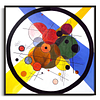Take a photo of a barcode or cover
This is such a great book. My fave from McEwan. So many meaty subjects to ponder. I highly recommend to every/anyone.
It's a busy Saturday for Mr. Henry Perowne, even though it's his day off. His relatively quiet life is bombarded by the real world from the moment he wakes up. When he finally gets to sleep early Sunday morning, we have learned a great deal about the true nature of this man and what it takes to be true to yourself and your family, despite the effects of outside events on your life.
I enjoyed this book so much. From the first sentence, I was hooked. Not due to the story or the themes but simply because McEwan is a fantastic writer. His writing draws you in and makes you interested in the story.
A fascinating book about a day in the life of a neurosurgeon, where he uncharacteristically contemplates the impending Iraq war and other such things as he looks outside the window at a burning plane at 4am.
A fascinating book about a day in the life of a neurosurgeon, where he uncharacteristically contemplates the impending Iraq war and other such things as he looks outside the window at a burning plane at 4am.
Reading this book of my own accord, and finding that it holds so many similarities to the troubling times we live in now is enough to give me goosebumps! It's helped me see things from others points of view, but it's also comforted me and has let me know that I'm not alone in my way of thinking. Besides this it's taught me to think and also what great writing is! Thank you Mr. McEwan!
As the jacket says, the best writer in the English language today.Yowza.
[b:Saturday|5015|Saturday|Ian McEwan|https://i.gr-assets.com/images/S/compressed.photo.goodreads.com/books/1431501825l/5015._SY75_.jpg|2307189] by [a:Ian McEwan|2408|Ian McEwan|https://images.gr-assets.com/authors/1404240951p2/2408.jpg] is set in Fitzrovia, London, on Saturday, 15 February 2003, as a large demonstration is taking place against the United States' 2003 invasion of Iraq. The protagonist, Henry Perowne, a 48-year-old neurosurgeon, has planned a series of chores and pleasures culminating in a family dinner in the evening. As he goes about his day, he ponders the meaning of the protest and the problems that inspired it; however, the day is disrupted by an encounter with a violent, troubled man.
As the story is set during the anti-war protests, it symbolises the divided nature of public opinion regarding the invasion of Iraq. In London, a large demonstration is organised to express dissent for the planned attack. Daisy, Henry's daughter, is very much on the protesters' side, but Henry is ambivalent. Due to moral and political ambiguities, Henry cannot firmly take a position for or against the war. With its clever, Ulysses-esque vibe, this novel shows how one man's life is haunted not only with apocalyptic terrors, but with fears of a more private nature—like what the hand of genetic fate may have in store, and the way these fears are intensified by love and family ties. Like with Atonement, it's a story of how life can change in an instant, for better or for worse.
What brings this novel together is the love and family connections which are presented as the most central and vital sources of fulfilment in Henry's life. Through these relationships, the novel explores the potential for profound gratification that these relationships can provide. One of the most prominent examples of this dynamic is Henry and Rosalind's marriage. Their relationship is portrayed as profoundly loving and affectionate, and the narrative draws connections between this sense of love and the mutual loyalty that they possess for each other.
As the story is set during the anti-war protests, it symbolises the divided nature of public opinion regarding the invasion of Iraq. In London, a large demonstration is organised to express dissent for the planned attack. Daisy, Henry's daughter, is very much on the protesters' side, but Henry is ambivalent. Due to moral and political ambiguities, Henry cannot firmly take a position for or against the war. With its clever, Ulysses-esque vibe, this novel shows how one man's life is haunted not only with apocalyptic terrors, but with fears of a more private nature—like what the hand of genetic fate may have in store, and the way these fears are intensified by love and family ties. Like with Atonement, it's a story of how life can change in an instant, for better or for worse.
What brings this novel together is the love and family connections which are presented as the most central and vital sources of fulfilment in Henry's life. Through these relationships, the novel explores the potential for profound gratification that these relationships can provide. One of the most prominent examples of this dynamic is Henry and Rosalind's marriage. Their relationship is portrayed as profoundly loving and affectionate, and the narrative draws connections between this sense of love and the mutual loyalty that they possess for each other.
There is suddenly something tremendously quaint in reading stories that involve anti-Bush, anti-Blair, and anti-Iraq War protests.
You wanna sit these characters down and say "You have NO idea what's coming..."
You wanna sit these characters down and say "You have NO idea what's coming..."
Trop de détails, de réflexions pas forcément perspicaces, surtout sur les "maux" de notre époque actuelle (terrorisme, guerre en Irak). Roman trop récent pour moi, Trop ancré dans le présent (pas forcément intéressant).
Un peu déçue, donc, après "L'Innocent", "le jardin de ciment" et "Expiation".
Un peu déçue, donc, après "L'Innocent", "le jardin de ciment" et "Expiation".
I think this is a typical Ian McEwan book, in that it describes a short, fairly tragic, period of time in a family's life in intricate, sometimes lovely, and sometimes downright boring detail. I liked the characters and the story well enough, but I also wanted it to be over, already--too many pages for a single day for me (Ivan Denisovich is another story).
I'm always amazed at how quickly I get through McEwan, even though it seems so dense. I love his writing, how he can take a day, an evening, a moment, and amplify it. I also love how he writes about writing, and I enjoyed the theater/surgery parallels here.
![Saturday by Ian McEwan 4th (fourth) Edition [Paperback(2006)] by Ian McEwan](https://assets.thestorygraph.com/assets/placeholder-cover-a3ae92250eb3301e32dc3eabf8d50576c2f047dda89f6ee7cfa9a859cb1fd746.jpg)


